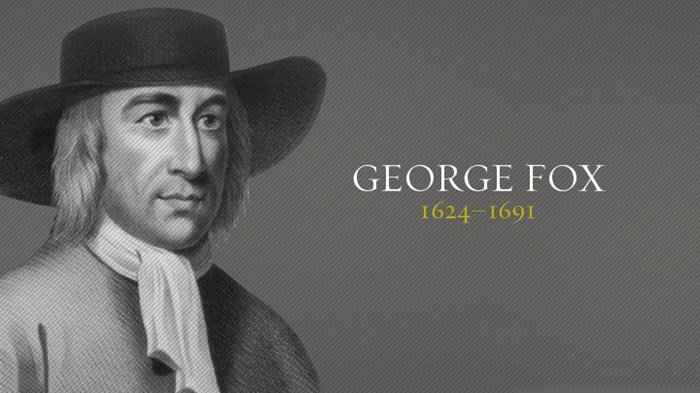
"These things I did not see by the help of man, nor by the letter … but I saw them in the light of the Lord Jesus Christ, and by his immediate spirit and power, as did the holy men of God by whom the Holy Scriptures were written."
Even as a child, George Fox knew he was somehow different. He was repelled when he watched older men "carry themselves lightly and wantonly towards each other" in pointless diversions and drunkenness. He vowed, "If ever I come to be a man, surely I shall not do so."
As a man, he went even further—founding a movement that helped others meet Christ and live lives worthy of their Lord.
The inner light
Fox was born in a small English village, the son of a weaver. He became a cobbler's apprentice, but, disgusted with the lax morals of his fellow apprentices, he quit and set off on a spiritual journey. He traveled all over England, attending religious meetings and seeking illumination. He immersed himself in the Bible and wrestled to discover truth.
He eventually came to the conclusion that all sects were wrong and that their worship was a disgrace. Pastors who worked for a salary were nothing but "journeymen." Hymns, sermons, sacraments, and creeds hindered—rather than helped—people to worship.
Instead, Fox looked to the "inner light" for inspiration. This inner light, he argued, was in everyone, though it might be very dim in some. It is not intellect nor natural reason nor morality, but a capacity to recognize and accept God. It also makes it possible for people to understand and believe the Bible. Therefore it is through the inner light, first and foremost, that people come to know God.
Timeline |
|
|
1609 |
John Smyth baptizes self and first Baptists |
|
1611 |
King James Version of Bible Published |
|
1620 |
Mayflower Compact drafted |
|
1624 |
George Fox born |
|
1691 |
George Fox dies |
|
1707 |
J.S. Bach publishes first work |
“These things I did not see by the help of man, nor by the letter," he concluded, "but I saw them in the light of the Lord Jesus Christ, and by his immediate spirit and power, as did the holy men of God by whom the Holy Scriptures were written."
Persecution and practice
He was hesitant to share these insights at first, but one day he said he felt called by the Spirit to speak out at a Baptist meeting. The promptings of the Spirit became increasingly frequent; in his journals he regularly writes, "At the command of God, I … " and "I was moved to go … "
As he went forth, however, "with the word of life into the world, the world swelled and made a noise like the great raging waves of the sea." In many places, Fox was treated with contempt; he was physically thrown from meetings, beaten, stoned, and jailed. He spent a total of six years in prison—the first time, for interrupting a preacher who was saying that ultimate truth was found in the Bible. Other times it was for blasphemy or for conspiring against the government (i.e., for his pacifism).
Still, he gathered followers. They structured their worship so nothing could get in the way of the Spirit. The sacraments were rejected, and the service took place in silence, though any who felt called to speak or pray aloud could do so. People began calling them "quakers" because many would tremble as they were moved by the Spirit, but Fox preferred the term "friends."
To thwart individualism, Fox emphasized the importance of community and love. Decisions among the Friends were not made by majority vote but by consensus. If consensus wasn't reached, decisions were postponed until the group as a whole could discern the leading of the Spirit.
The Friends also refused to swear oaths or tithes or bow to their betters (they insisted on using the familiar "thou" instead of the respectful "you"). Like their founder, they were staunch pacifists.
Spreading the faithFox traveled abroad to spread his gospel of the inner light. In Scotland, he was accused of sedition. He went to Ireland, then to the Caribbean and North America; he also made two visits to the Continent.
In both England and America, the Friends were severely persecuted for decades, but the movement continued to grow. The most famous convert in America was William Penn, founder of Pennsylvania.
The Quakers have never become large numerically (there are now a mere half-million worldwide), but they eventually earned the respect of the other Christian denominations.

Support Our Work
Subscribe to CT for less than $4.25/month


























